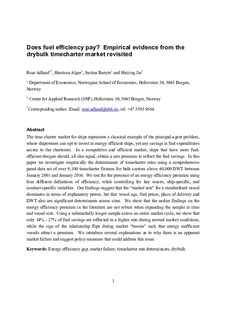| dc.contributor.author | Ådland, Roar Os | |
| dc.contributor.author | Alger, Harrison Marshall | |
| dc.contributor.author | Banyte, Justina | |
| dc.contributor.author | Jia, Haiying | |
| dc.date.accessioned | 2018-03-27T08:54:47Z | |
| dc.date.available | 2018-03-27T08:54:47Z | |
| dc.date.created | 2016-11-23T12:08:40Z | |
| dc.date.issued | 2017 | |
| dc.identifier.citation | Transportation Research Part A: Policy and Practice. 2017, 95 1-12. | nb_NO |
| dc.identifier.issn | 0965-8564 | |
| dc.identifier.uri | http://hdl.handle.net/11250/2492200 | |
| dc.description.abstract | The time charter market for ships represents a classical example of the principal-agent problem, where shipowners can opt to invest in energy efficient ships, yet any savings in fuel expenditures accrue to the charterers. In a competitive and efficient market, ships that have more fuel-efficient designs should, all else equal, obtain a rate premium to reflect the fuel savings. In this paper we investigate empirically the determinants of timecharter rates using a comprehensive panel data set of over 9,100 timecharter fixtures for bulk carriers above 40,000 DWT between January 2001 and January 2016. We test for the presence of an energy efficiency premium using four different definitions of efficiency, while controlling for key macro, ship-specific, and contract-specific variables. Our findings suggest that the “market rate” for a standardised vessel dominates in terms of explanatory power, but that vessel age, fuel prices, place of delivery and DWT also are significant determinants across sizes. We show that the earlier findings on the energy efficiency premium in the literature are not robust when expanding the sample in time and vessel size. Using a substantially longer sample across an entire market cycle, we show that only 14% - 27% of fuel savings are reflected in a higher rate during normal market conditions, while the sign of the relationship flips during market “booms” such that energy inefficient vessels attract a premium. We introduce several explanations as to why there is an apparent market failure and suggest policy measures that could address this issue. | |
| dc.language.iso | eng | nb_NO |
| dc.relation.uri | http://www.sciencedirect.com/science/article/pii/S0965856416309880 | |
| dc.title | Does fuel efficiency pay? Empirical evidence from the drybulk timecharter market revisited | nb_NO |
| dc.type | Journal article | nb_NO |
| dc.type | Peer reviewed | nb_NO |
| dc.description.version | publishedVersion | |
| dc.description.version | acceptedVersion | |
| dc.source.pagenumber | 1-12 | nb_NO |
| dc.source.volume | 95 | nb_NO |
| dc.source.journal | Transportation Research Part A: Policy and Practice | nb_NO |
| dc.identifier.doi | 10.1016/j.tra.2016.11.007 | |
| dc.identifier.cristin | 1403257 | |
| dc.relation.project | Norges forskningsråd: 233985 | nb_NO |
| cristin.unitcode | 191,30,0,0 | |
| cristin.unitname | Institutt for samfunnsøkonomi | |
| cristin.ispublished | true | |
| cristin.fulltext | original | |
| cristin.fulltext | postprint | |
| cristin.qualitycode | 2 | |
